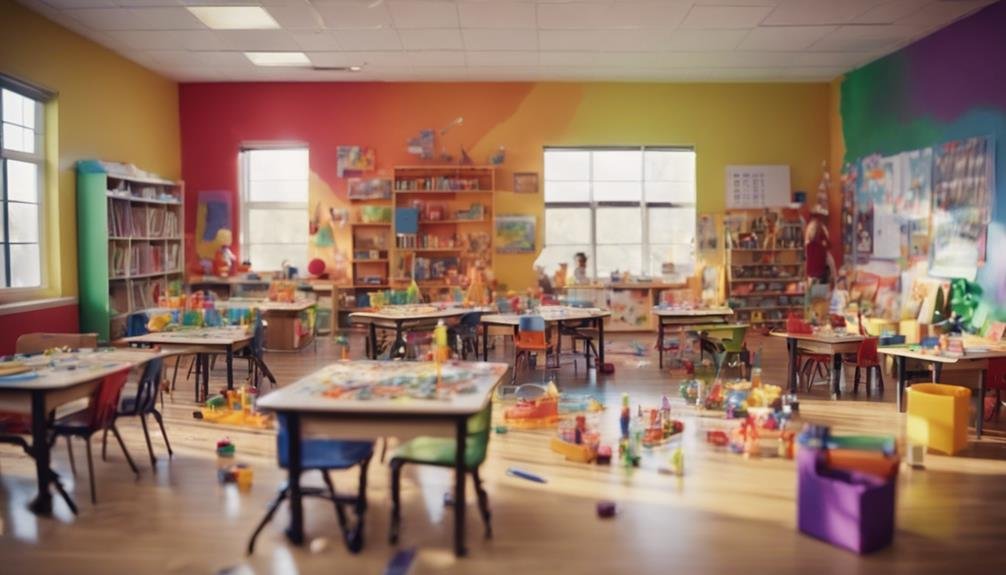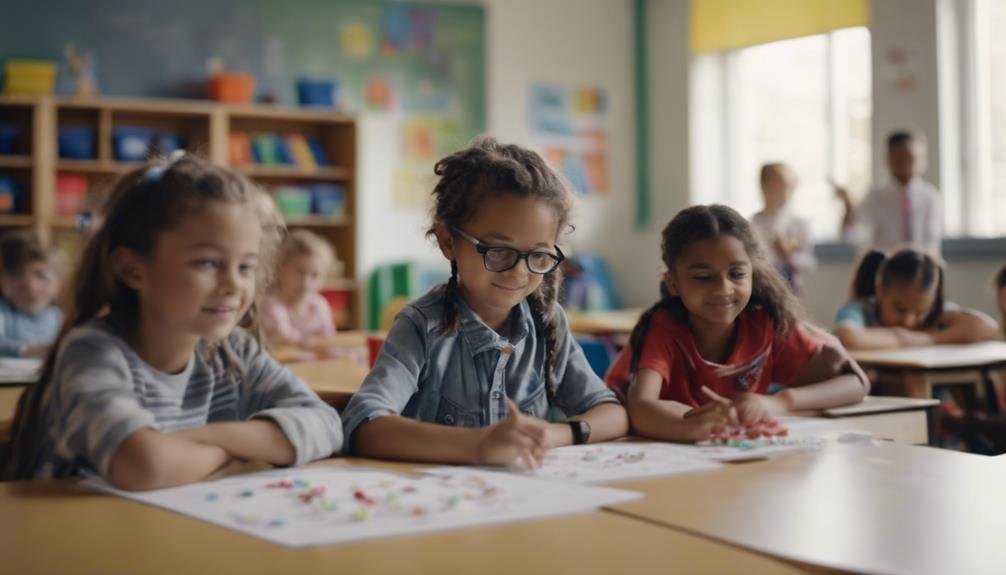"Cherishing Little Steps - A Haven for Baby and Family Journeys"
How to Choose the Right Preschool for Your Child
When starting on the journey of finding the ideal preschool for your child, it's like sifting through a garden to find the perfect bloom that will nourish and help them grow.
As you navigate through the myriad of options, each boasting unique features and promises, consider the essential elements that will shape your child's early education experience. From the location that sets the stage to the teaching philosophy that guides the curriculum, every aspect plays a pivotal role in your child's formative years.
Your child's preschool choice is not just a decision; it's a stepping stone towards their future.
Key Takeaways
- Consider proximity to home or work for convenience and time-saving benefits.
- Prioritize child-centered teaching approaches like play-based learning for holistic development.
- Evaluate teacher qualifications, classroom environment, and class sizes for individual attention.
- Explore extracurricular activities, costs, and schedules to align with your child's interests and needs.
Location

When selecting a preschool for your child, consider the proximity of the location to your home or workplace to guarantee convenience and ease of transportation. The location of the preschool plays an important role in your daily routine. Opting for a preschool that's in close proximity can save you valuable time during the hectic mornings and afternoons. Not only does it make commuting more accessible, but it also makes sure that you can reach your child quickly in case of any emergencies.
Having a preschool near your home or workplace allows for easier drop-offs and pick-ups, fostering a smoother transition for both you and your child. The convenience of a nearby location can also provide a sense of security, knowing that you aren't far away if your child needs you.
Additionally, being closer to the preschool can enhance your involvement in school activities and events, creating a stronger bond between you, your child, and the school community. So, when exploring preschool options, remember to prioritize the proximity and accessibility of the location for a stress-free and harmonious experience.
Teaching Philosophy
Consider the teaching philosophy of a preschool as a key factor in determining the best educational environment for your child's early development. When choosing a preschool that aligns with your values and beliefs, here are some essential points to think about:
- Child-Centered Approach: Look for a preschool that prioritizes your child's unique needs and interests, fostering individual growth and development.
- Play-Based Learning: Opt for a school that values play as a fundamental component of education, recognizing its vital role in enhancing cognitive, social, and emotional skills.
- Holistic Development: Seek a preschool that focuses on nurturing not only academic abilities but also emotional intelligence, creativity, and physical well-being.
- Hands-On Experiences: Select a learning environment that offers hands-on activities and real-world experiences to encourage curiosity, exploration, and a love for learning.
Curriculum

To make sure your child receives a well-rounded education that meets their developmental needs, examining the curriculum of a preschool is essential. When evaluating a preschool's curriculum, consider whether it incorporates play-based learning, which allows children to explore, experiment, and learn through hands-on activities. Play-based learning fosters creativity, problem-solving skills, and social development in young learners.
Some preschools follow structured programs that provide a balance between play and more formal learning activities. Others may embrace specific educational philosophies like the Montessori approach or the Reggio Emilia philosophy. The Montessori approach emphasizes independence, self-directed learning, and hands-on materials to promote holistic development. On the other hand, the Reggio Emilia philosophy focuses on child-led exploration, collaboration, and the arts as essential components of learning.
Teacher Qualifications
Exploring the qualifications of the teachers at a preschool plays an essential role in ensuring your child receives quality education and care. Here are some key points to contemplate when evaluating teacher qualifications:
- Classroom Environment: Teachers who create a warm, welcoming, and stimulating classroom environment can greatly impact your child's learning experience.
- Experience Level: Teachers with years of experience often have a deep understanding of child development and effective teaching methods.
- Credentials: Look for teachers with relevant degrees or certifications in early childhood education, as these qualifications demonstrate a commitment to professional growth.
- Training Programs: Teachers who regularly participate in training programs and workshops stay updated on the latest educational practices, ensuring your child receives the best possible instruction.
Class Size

Ideal class sizes in a preschool setting can greatly impact your child's learning and development. When considering a preschool, pay attention to the student to teacher ratio. A lower ratio means more essential attention for each child, fostering a conducive learning environment. Smaller class sizes also offer increased socialization opportunities as children can interact more closely with both teachers and peers. This setting allows for stronger relationships to form, aiding in your child's social development.
In a preschool with a small class size, teachers can better tailor activities to suit each child's needs and interests, promoting a more personalized learning experience. With fewer children in the class, there's more room for hands-on, play-based learning, which is vital for young children's cognitive and social growth. This approach encourages exploration, creativity, and problem-solving skills in a nurturing environment. Remember, the right class size can make a significant difference in your child's early education journey.
Safety Measures
Ensuring a secure environment is paramount when selecting a preschool for your child. Here are four key aspects to consider when evaluating safety measures at a preschool:
- Security Protocols: Look into the school's security protocols, such as restricted access entry systems, visitor sign-in procedures, and staff training on handling emergencies. Knowing that these protocols are in place can provide peace of mind.
- Emergency Procedures: Inquire about the preschool's emergency procedures for situations like fires, natural disasters, or medical emergencies. Understanding how the school handles these critical situations can help you gauge their level of preparedness.
- Safety Inspections: Check if the preschool undergoes regular safety inspections and adheres to safety regulations. A school that prioritizes safety will often have transparent processes for maintaining a secure environment.
- Communication Plans: Learn about how the preschool communicates safety-related information to parents. Clear communication channels during emergencies can ensure that you're promptly informed about any incidents.
Parental Involvement

When considering a preschool for your child, your involvement as a parent plays a significant role in shaping their early education experience. Parental engagement is key to fostering a strong foundation for your child's learning journey. By actively participating in your child's preschool activities, you not only show them the importance of education but also support their social and emotional development.
Community partnerships can enhance your involvement by providing additional resources and opportunities for you to engage with your child's preschool. These partnerships may offer workshops, events, or volunteering opportunities that allow you to be part of your child's educational environment.
Building strong relationships with your child's teachers and caregivers is another vital aspect of parental involvement. Regular communication can help you stay informed about your child's progress, challenges, and achievements. It also enables you to work together with the preschool staff to create a supportive and nurturing environment for your child. Remember, your active participation can make a significant difference in your child's preschool experience.
Extracurricular Activities
Engage your child in a variety of enriching extracurricular activities to complement their preschool experience and foster holistic development. Extracurricular activities play an essential role in shaping your child's interests, skills, and social interactions.
Here are four wonderful options to ponder:
- Sports Programs: Encourage your child to participate in sports programs to promote physical health, teamwork, and discipline. Whether it's soccer, gymnastics, or swimming, sports can boost confidence and instill a sense of achievement.
- Art Classes: Nurture your child's creativity through art classes where they can explore different mediums and techniques. Art fosters self-expression, imagination, and fine motor skills, laying a foundation for future artistic endeavors.
- Music Lessons: Introduce your child to the world of music through lessons in instruments or singing. Music enhances cognitive abilities, emotional development, and can be a source of joy and relaxation.
- Dance Activities: Enroll your child in dance classes to improve coordination, rhythm, and self-confidence. Dancing isn't only a fun way to stay active but also helps in developing poise and grace.
Cost and Fees

Considering the cost and fees associated with preschool is an important aspect to evaluate when selecting the right fit for your child's early education journey. It's essential to understand the financial commitments involved to make sure they align with your budget and expectations. Here is a breakdown of common costs you might encounter:
| Cost Category | Description | Tips |
|---|---|---|
| Tuition | Monthly fee for attending preschool. | Inquire about any available financial assistance programs. |
| Registration Fee | One-time fee for enrollment. | Ask about possible hidden charges that may arise later. |
| Supplies | Cost for materials like books, crafts. | Look for schools that include supplies in the tuition. |
| Uniforms | Cost of specific clothing requirements. | Check if there are second-hand options to save money. |
| Field Trips | Expenses for outings or special events. | Clarify if field trip costs are included or extra. |
When exploring preschool options, be proactive in understanding all costs involved, inquire about financial assistance opportunities, and watch out for any potential hidden charges to make an informed decision that fits your financial plan.
Schedule and Hours
As you plan your child's preschool experience, understanding the schedule and hours of operation is key to ensuring a smooth change into their early education environment. Here are some important points to consider:
- Flexibility Options: Look for preschools that offer flexibility in their schedules to accommodate your needs. Having options for full-day, half-day, or extended hours can be helpful for working parents or those with busy schedules.
- Extended Hours: If you require care beyond traditional school hours, consider preschools that provide extended hours. This can give you peace of mind knowing your child is in a safe and nurturing environment for an extended period.
- Daily Routine: A consistent daily routine can provide stability for your child. Make sure to inquire about the structured activities, playtime, learning periods, and meal times to see if they align with your child's needs.
- Nap Time: Rest is important for young children. Check if the preschool has designated nap times and a comfortable sleeping area to ensure your child gets the necessary rest during the day.
Frequently Asked Questions
How Does the Preschool Handle Children With Special Needs or Learning Differences?
When it comes to handling children with special needs or learning differences, the preschool creates an inclusive environment that provides individualized support. Your child will feel valued, understood, and encouraged to thrive.
What Is the School's Policy on Discipline and How Do They Handle Behavioral Issues?
When it comes to discipline and behavioral issues, the school focuses on positive reinforcement and fair consequences. They prioritize behavior management through effective conflict resolution strategies, ensuring a supportive and nurturing environment for your child to thrive.
How Does the Preschool Handle Transitions, Such as Moving From One Classroom to Another or Starting School for the First Time?
Handling changes at preschool can be challenging, but rest assured, with strong change support and a nurturing classroom environment, your child will thrive. Social skills blossom with parent involvement, creating a seamless change experience.
What Is the School's Policy on Sick Children and How Do They Prevent the Spread of Illness?
When it comes to your child's health, understanding the school's sick policies and health protocols is important. Make sure they have preventative measures in place to minimize illness spread and prioritize your little one's well-being.
How Does the Preschool Communicate With Parents About Their Child's Progress and Development?
Curious about how the preschool will keep you in the loop? Parent-teacher conferences and progress reports are your insiders. Regular updates on your child's development will make you feel connected and reassured.
Conclusion
When choosing the right preschool for your child, consider the location, teaching philosophy, curriculum, teacher qualifications, class size, parental involvement, extracurricular activities, cost and fees, and schedule.
Picture your little one laughing, learning, and growing in a nurturing environment that fosters their creativity and curiosity.
Trust your instincts and choose a preschool that feels like the perfect fit for your child's unique needs and personality.
You're making an investment in their future, so choose wisely.


